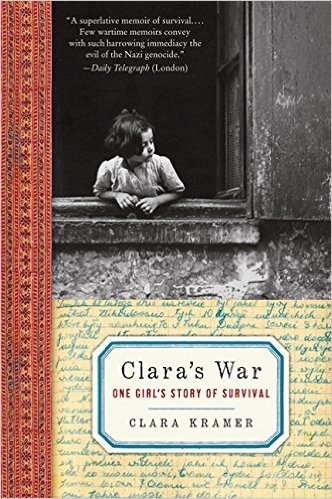
Clara’s War – One Girl’s Story of Survival
Clara’s War: One Girl’s Story of Survival
Clara Kramer with Stephen Glantz
Harper Collins, 2009
339 pages
This book is based on Clara Kramer’s diary of her years in hiding from the Nazis.
Valentine Beck, a Volksdsdeutsch (ethnic German), his wife Julia, and their daughter Ala allowed eighteen Jews, including Clara and her family, to hide in a small, suffocating bunker that was dug out of the basement underneath his house. Beck was known as a womanizer, a rabid antisemite and an alcoholic and perhaps this gave him the cover he needed to keep the family safe throughout the many terrifying experiences they encountered during their twenty months in hiding.
A typical teenager before World War II, Clara and her family lived in Zolkiew, Poland, where there were approximately five thousand Jews. Clara kept a diary on scraps of paper, written with a small pencil given to her by Beck. She recorded the most poignant details including the tragic death of her sister, the fire that broke out in the house, Beck’s affair with one of the hidden Jewish women who was living in the bunker, SS soldiers moving into the Becks’ house the last four months of the war, drinking sessions with the SS in Beck’s house, and Beck’s arrest by the Russians at the end of the war.
Once in the bunker the eighteen people had to learn to live together and retain their human dignity. Every sound could be heard upstairs. At any minute they could give themselves away. Rules were made, the buckets used as toilets had to be emptied, Jewish festivals were observed, sleeping areas were arranged as fairly as possible, and food was distributed amongst them as evenly as circumstances allowed. Surely, this is an example of spiritual resistance to the utmost degree.
The final chapter of the book deals with liberation and return to life after the Holocaust.
Valentine, Julia, and Ala were recognized as Righteous Among the Nations in 1995. Their persistence and unwillingness to give up or betray “their” hiding Jews to the authorities, and their extreme kindness and consideration in the face of the utmost danger is almost unbelievable. The compelling question for educators is why Beck, undoubtedly a known antisemite, made the crucial decision to hide and care for eighteen Jews at great risk to himself and his family.
Clara, aged 81 at the time of publication, has dedicated her life to speaking about her experiences during the Holocaust. Her diary may be found in the U.S. Holocaust Memorial Museum in Washington, D.C.
